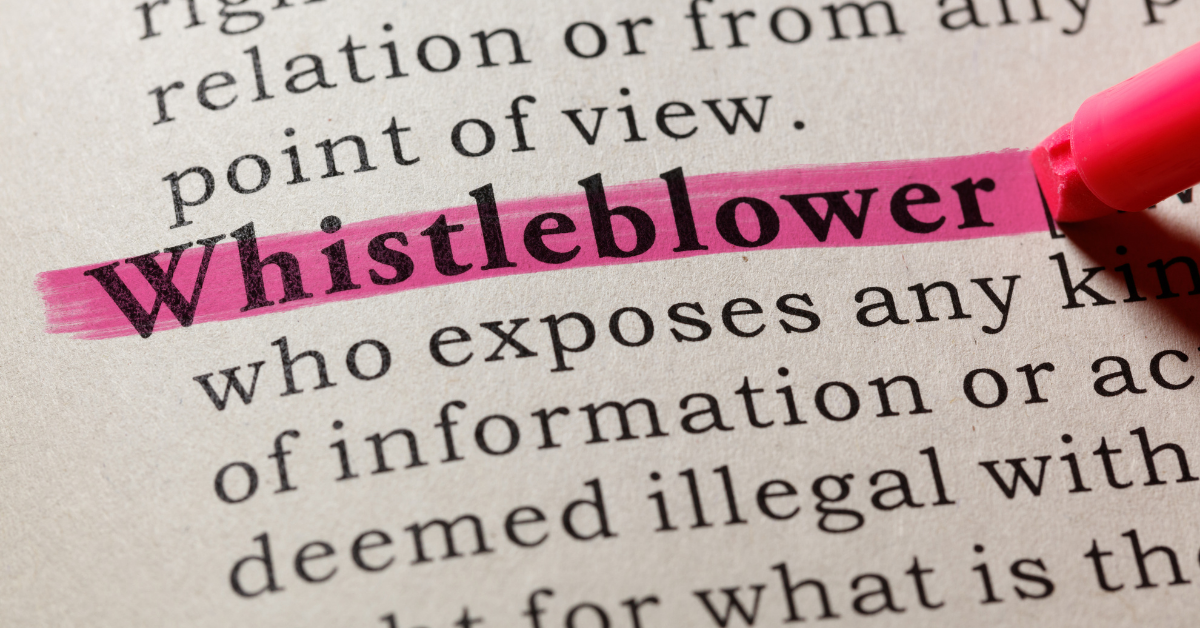You deserve to be able to report improper or illegal activity at work without fear. If that’s been you in the past, you may be what’s called a “whistleblower.” Whistleblowers are employees who report or expose illegal, unethical, or fraudulent activities within their organizations. Whistleblowing can be a risky and courageous act, as whistleblowers may face retaliation, harassment, or termination from their employers. However, whistleblowers also play a vital role in ensuring accountability, transparency, and integrity in the public and private sectors.
As a law firm that prides itself on supporting the concept of justice in its many forms, we are especially sensitive to protecting the rights of whistleblowers.
In Illinois, whistleblowers are protected by various laws and regulations that aim to prevent and remedy retaliation and to reward and incentivize whistleblowing. Let’s go over some of the key whistleblower protections in the state, and what employees need to know before, during, and after blowing the whistle.
The Illinois Whistleblower Act
The Illinois Whistleblower Act is a state law that protects employees who disclose information concerning unlawful acts to public bodies, such as government agencies, law enforcement, or regulatory authorities. The law also protects employees who refuse to participate in illegal activities at work.
Under the Illinois Whistleblower Act, employers are prohibited from taking any retaliatory action against whistleblowers, such as firing, demoting, suspending, or discriminating against them. Retaliatory action also includes threats, harassment, or intimidation that would deter a reasonable employee from reporting wrongdoing.
If an employer violates the Illinois Whistleblower Act, the whistleblower can file a lawsuit in court and seek remedies, such as:
- Reinstatement of employment with the same seniority and benefits
- Two times the amount of back pay, plus interest
- Compensation for any special damages, such as emotional distress or medical expenses
- Payment of reasonable attorney’s fees and costs
The whistleblower must file the lawsuit within three years of the retaliation, or within one year of discovering the retaliation, whichever is later.
The Illinois False Claims Act
The Illinois False Claims Act is another state law that protects and rewards whistleblowers who expose fraud or false claims against the state or local governments. The law covers a wide range of fraudulent schemes, such as:
- Billing the government for goods or services that were not delivered or performed
- Overcharging or inflating the price of goods or services
- Misrepresenting the quality or quantity of goods or services
- Falsifying records or documents to support false claims
- Concealing or avoiding an obligation to pay or refund the government
- Violating tax laws, except for income tax laws
The Illinois False Claims Act allows whistleblowers to file a qui tam lawsuit on behalf of the state or local government, and to share in a percentage of the recovery. The law also authorizes the Illinois Attorney General to intervene and take over the lawsuit, or to decline and allow the whistleblower to proceed on their own.
The amount of the whistleblower’s reward depends on several factors, such as:
- Whether the government intervened or not
- Whether the whistleblower planned or initiated the fraud or not
- Whether the lawsuit was based on public information or not
- The extent of the whistleblower’s contribution to the case or not
Generally, the whistleblower can receive between 15% and 30% of the recovery, plus reasonable attorney’s fees and costs. The recovery may include up to three times the actual damages, plus civil penalties for each false claim.
The whistleblower must file the qui tam lawsuit within six years of the fraud, or within three years of when the government knew or should have known of the fraud, whichever is later. However, the lawsuit cannot be filed more than ten years after the fraud.
Other Whistleblower Protections in Illinois
In addition to the Illinois Whistleblower Act and the Illinois False Claims Act, there are other whistleblower protections in Illinois that apply to specific industries, sectors, or issues. For example:
- The Illinois State Officials and Employees Ethics Act protects state employees who report or testify about violations of the ethics code, such as conflicts of interest, bribery, or misuse of public funds.
- The Illinois Human Rights Act protects employees who oppose or report discrimination or harassment based on race, color, religion, sex, national origin, age, disability, or other protected characteristics.
- The Illinois Environmental Protection Act protects employees who report or testify about violations of environmental laws or regulations, such as pollution, waste disposal, or hazardous substances.
- The Illinois Health Care Worker Protection Act protects health care workers who report or testify about violations of health care standards or regulations, such as patient safety, quality of care, or infection control.
- The Illinois Whistleblower Reward and Protection Act protects and rewards whistleblowers who expose fraud or false claims against the federal government, such as Medicare or Medicaid fraud, defense contractor fraud, or tax fraud.
These are just some examples of the whistleblower protections in Illinois. There may be other federal, state, or local laws that protect whistleblowers in different situations. Therefore, it is important for employees to consult with an experienced whistleblower attorney before blowing the whistle, to understand their rights and options, and to avoid any potential pitfalls or risks.
Whistleblowing in Illinois: A Guide for Employees
Whistleblowers are valuable and courageous employees who expose and prevent wrongdoing in their organizations. In Illinois, whistleblowers are protected by various laws and regulations that aim to prevent and remedy retaliation, and to reward and incentivize whistleblowing. However, whistleblowing can also be a complex and challenging process, that requires careful planning and legal guidance. Therefore, employees who are considering blowing the whistle should seek the advice of a qualified whistleblower attorney, who can help them navigate the legal system and protect their interests.


